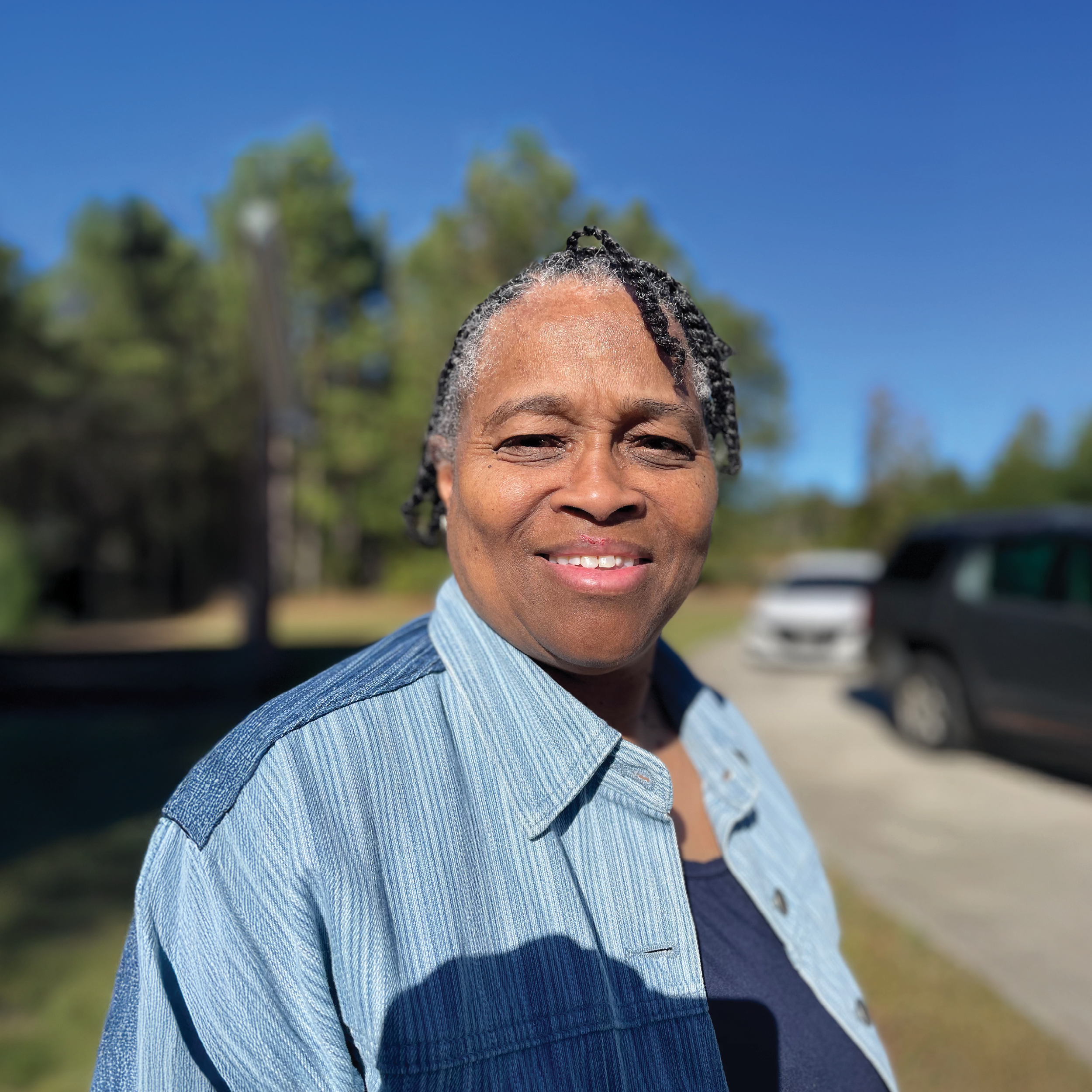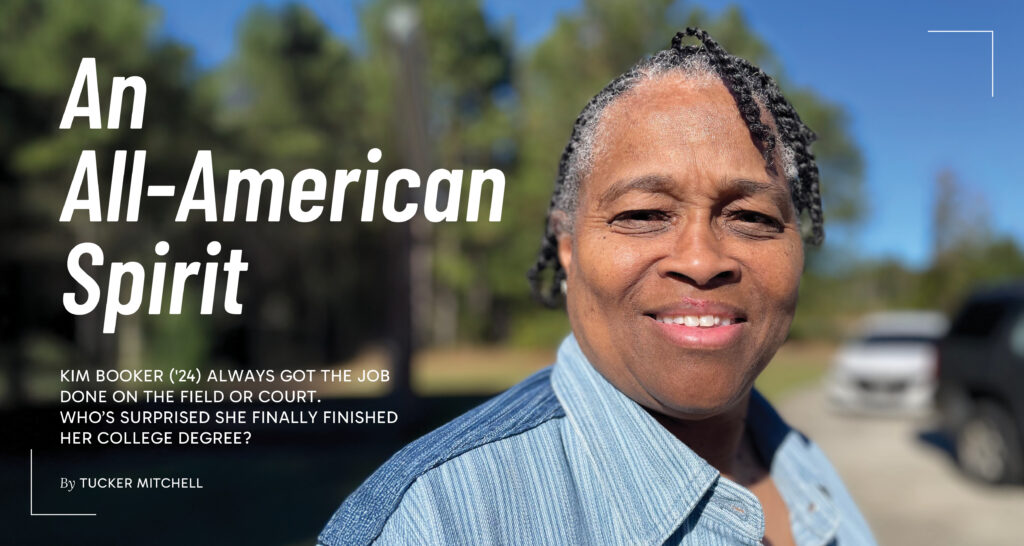December 10, 2024

An All-American Spirit
An All-American Spirit
By Tucker Mitchell | Fall/Winter 2024 | FMU Focus Magazine Fall/Winter 2024

Kim Booker (’24) always got the job done on the field or court.
Who’s surprised she finally finished her college degree?
It all came so easily for Kim Booker.
Growing up just outside the little Union County town of Carlisle, S.C., she did what she wanted to do and she usually did it well.
Make good grades? No problem. Re-line the brakes on the family car? Got that.
Sports? Oh, c’mon.
Run, jump, throw? Easy. Shoot a tennis ball through a homemade hoop? Hit a rock with a stick? Do anything with any kind of ball?
Of course. It was simple for Kim, like waking up every morning and falling out of bed. Maybe easier.
“I would guess you would say I was a natural,” says Booker. “Whatever it was, I usually picked it up pretty quick. I could take something apart and put it back together. I could play all the sports the first time I tried. I guess you could say I was blessed.”
Booker’s gifts led her down a magical path in the world of competitive athletics.
At Union County High School, she powered both the girls’ basketball team and the softball team to unbeaten seasons and state titles in 1984. She starred on the volleyball team in her spare time.
Booker’s basketball coach at Union was Anne Long, the South Carolina coaching legend. Long says Booker, her point guard, was a little raw, but possessed a rare combination of abilities.
“She had not played a lot of basketball when I met her,” says Long, “but she was a quick learner, soaked stuff up like a sponge. And she was a good athlete, quick and fast, and physically strong. But as important as that was, I’d say that she was an even better person. She had a strong character, really put everything into the game. She was a coach’s player.”
Long, who won eight state titles at two different South Carolina high schools, says she can still see Booker diving out of bounds after a loose ball in the 1984 championship game.
“If she thought it helped the team, she did it,” says Long. “You could depend on her.”
FMU: A Good Fit
Booker’s high school exploits drew the attention of a number of colleges. She chose Francis Marion University. It was relatively close, was not too big, and one of her assistant coaches in high school, Pearl Moore, had done fairly well there, as most followers of FMU athletics will recall.
Booker did well, too.
She began her career playing (and excelling) at three varsity sports – softball, basketball and volleyball – before being forced to give up hoops because all the running made her short of breath. It turned out she had a lung condition related to emphysema. The doctor who made the diagnosis wanted her to quit every sport.
“But I said, ‘No doc! You’ve got to let me at least play softball,’” recalls Booker. “He said ‘okay’, and then I kind of snuck into volleyball, too.”
Booker was a softball phenom. In 170 career games, Booker hit .413, scored 215 runs, pounded 29 homers, and stole 131 bases. She was named to the All-America team every year she played.
FMU went 142-35 in softball the four years Booker played, and went to the NAIA World Series three times. In 1987, they reached the finals before losing to Kearney State 1-0.
Ann Beeson, who coached Booker in softball at FMU, says Booker could do just about anything she wanted on the softball field.
“She was a tremendous athlete,” says Beeson. “College was a big deal for Kim, and FMU was a good landing spot, a good fit. But she could have played for any school in the country, NAIA or NCAA. She had power, speed, a great throwing arm. … She had a knack for extra base hits, and because of that, she received a lot of intentional walks. But with her speed, that often turned
into an extra base anyway when she’d steal a base or two. She was a real headache for other teams. We were blessed to have her.”
And then the blessings stopped.
One class short
Booker’s senior year at FMU was a struggle. The team still possessed the dynamic duo of Booker and catcher Kristi Anderson, also a four-time All-American, but injuries depleted the roster. Booker had to change positions, moving from centerfield to shortstop. She was okay there, but not as good as she’d been in center. The switch may have cost her her fourth berth on the NAIA All-American first team. If she’d managed the feat, she’d have been the only player in NAIA history to accomplish it.
“We’ll never know that, of course,” says Beeson. “I think it may have hurt a little bit. She was a great center fielder, but just a ‘good’ shortstop. But, it’s what we had to do, and she was all for it. She was all about the team.”
The team sagged to a 27-12 record and missed the World Series. That was disappointing, but a more significant setback came in the academic field.
One of Booker’s classes was canceled in the middle of her final semester. Booker recalls it having something to do with the professor quitting or having to leave unexpectedly. Whatever the case, the result was unfortunate for the affected students, especially for Booker, who had just enough credits to graduate if she passed that class. Canceling the class – it was too late in the semester to add a new one at that point – meant Booker wouldn’t graduate on time.
In fact, it would take her another 35 years.
Here comes life …and MS
Booker admits it now. Leaving school that spring without a diploma was just plain dumb, but 21-year-olds sometimes do dumb things.
“It’s easy to see now that I was hard-headed,” she says. “But I was so done with school that spring. That’s how I felt. ‘I’m not going back.’ That was my official position. And I didn’t. It was time to move on.”
Life was calling. A job, a career, a family maybe.
Booker moved back home and all that did happen. But then, another interruption.
While still a young woman – she wasn’t out of her 20s yet – she started getting the oddest sensations in her hands and face. It was kind of like numbness, but it was also kind of not. She went to a doctor who asked her some strange questions about travel to certain places, pursed his lips, looked out the window, and scratched his head. Finally he said, “it looks like you have multiple sclerosis.”
The natural athlete couldn’t believe it. She asked for a second opinion and received it: you really do have MS.
She began the normal pharmaceutical regimen and got busy figuring out how to deal with the waves of symptoms that came her way.
Multiple Sclerosis (MS) is a relatively common, progressive neurological disease that is typically diagnosed in young adults. Perhaps half a million Americans have MS.
Despite its prevalence, the disease and its causes are not well understood. MS is related to a compromised immune system. In patients with MS, the immune system mistakenly orders the body to attack its own brain and central nervous system. Such attacks can – no surprise here – cause severe debilitation. But MS is not predictable. Some sufferers experience only mild symptoms or even none at all. Others battle severe disorders that include numbness, tremors, loss of vision, loss of balance, paralysis, depression, and changes in mental function.
Booker’s daughter, Shekima Moore, recalls the day when she was in elementary school when her mother set her down for a frank talk about an unlikely subject. It was, says Moore, “a strange day.
“She said, ‘now Shekima, there may be some days coming when I wake up and don’t know who you are. Don’t worry about that. We’ll pray about it, and it probably won’t last, and we’ll get through it,’” says Moore. “What she said did happen and we did get through it. … I worked to keep her spirits up. I still do. But I’ll tell you, despite all that was going on, I never heard much bad from her, no complaining, no bad JuJu.”
Booker experienced a variety of symptoms, many of which came and went. She held regular jobs, primarily with FedEx, for many years, though not without some difficulty. Finally, a few years ago, her condition reached a point where she had to retire.
That wasn’t what she wanted to do, but as the door to a so-called normal life swung shut, other doors opened. Booker began volunteering at her church, and in the Union County school system, where she mentors students needing extra support.
And, she decided she was ready to become a student again.
First Generation
Booker came from a family with sturdy roots and a terrific pool of athletic genes. Her brother, Gerald, was a superb football player in high school and at Clemson. His sons, Trevor, Devin, and Darrion, were star basketball players at Union County High and all went on to play college basketball. Trevor played nine seasons in the NBA. Devin, who played with Trevor at Clemson, played professionally in Europe.
Kim says her mother, Ruth Booker, was a wonderful athlete as well, although Kim didn’t know that until just before her mother died when an aunt told her that her mom had been as good as Kim, if not better.
“I said, ‘mom why didn’t you ever tell me that?’” Booker says. “Mom said, ‘oh, I didn’t want you being bothered by being compared to me’.”
Ruth Booker and her husband, McElroy, didn’t finish school. Mom got a little further than dad, but neither made it to high school, much less out of it. Nonetheless, they stressed education. It was clear to Kim that if she didn’t bring home good grades there’d be no sports. So, she did well.
“All us kids (four sisters, one brother) did well in school,” says Booker. “There was no one in our family who had been to college until that generation. But I went and my brother did and my sisters all have associate degrees. I don’t know where their (her parents) interest in education came from – maybe it was because they didn’t have an education and saw how hard it was – but they pushed us to do well and it worked.”
Kim promised her mother that she’d go back and get her degree. She made the same vow to her children.
Life kept getting in the way. Work, family, her physical condition – besides MS, a few years ago she was diagnosed with Lupus, another autoimmune disorder.
“A lot of people were on me about it (getting the degree),” says Booker. “I was on me, too. It was on my mind. One day I was visiting my doctor and he said, ‘are you ever going to get it?’ He knew what was happening to me. It seemed like now or never. I told my daughter, ‘I’m going for it.’”
Road scholar
Booker needed one class to graduate when she left school in 1989, but by the time she decided to go back, she needed 30 hours. That’s the rule for students who’ve been out of school for more than 10 years. It recognizes the potential for change in curriculum and student abilities, and it protects the academic integrity of the degree.
That meant the equivalent of two full semesters for Booker. Most of the courses could be completed online, from her home. But she needed to complete two labs that could only be done in person.
FMU worked with Booker to schedule the labs on the same day so she and her daughter (Shekima did the driving) would only have to make one trip per week from Carlisle. The accommodation helped, but it was still grueling. Booker was in her 50s and she had MS. Would she have energy tomorrow? Would she be able to concentrate for five or six hours? She never knew.
“It was very different,” says Booker. “I hadn’t done it for a long time. The folks at FMU were great. They supported me, were so encouraging. Dr. (Ednaliz) Rodriguez in biology told me I was going to do great in the lab. ‘Age is nothing but a number,’ she said. ‘I expect you to make an A or a B.’ But I hadn’t been in a lab since my freshman year. It was tough. I couldn’t have gotten through it without my professors.”
She had help at home, too.
Shekima recalls her mother coming home after one lab and telling her, “‘Shekima, I sat in there for two or three hours and I didn’t understand a word they were saying.’
“And so we opened up her book and read it together, and stayed up to 4:00, 4:30 a.m. trying to figure out what it was all about. And we did. She did. She got it done.”
Raw emotion was the order of the day when Booker graduated last spring. Tears flowed when FMU president Dr. Fred Carter brought Kim Booker’s diploma to her seat in the Smith Center.
Shekima says the feelings were a mix of joy and happiness, amazement and … relief.
“Coming from the family she came from where no one had graduated from a four-year college, being the first to do that, and then doing it the way she did … well, you just wondered if this was really happening,” says Moore.
Pearl Moore, Booker’s high school coach and also a sort of sister-in-law since Booker’s two children are by her brother Wes, says she was “so very happy” when Booker got her degree.
“I’d been on her for a long time,” says Moore. “You can’t go to school for that long just for sports. You got to finish it up. When I was coming out, I had an offer to go play professional basketball right out of school, but I told ‘em, ‘no, I’ve got to finish this degree.’ We’ve had several of the (female athletes) who’ve done well at FMU who have come back lately and completed their work. I’m glad Kim is one of them.”
“There were times last March when I wanted to give up,” says Kim Booker. “But I said the Lord has brought me this far. He’s not going to leave me behind. I heard mom and dad’s voices, talking to me, telling me not to quit. And I didn’t. I did what I had to do and I got my degree. It’s the best thing I’ve ever done.”
Better than all her great moments in sports?
Booker nods. “No comparison,” she says.
It was an easy question.






